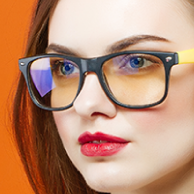Know
your
EYEGLASSES
Buying eyeglasses can be a daunting task especially when you have a wide variety of shapes, designs and discounts available around you to lure the eyes. Whereas a wrong size, wrong fit or a wrong frame can leave you with a sour experience. But don’t worry! This comprehensive guide will ensure you end up with ‘nothing but the perfect’ pair for your eyes.
Let us first know about an eyeglass frame in depth.
READ MORE
FRAME
COMPONENTS
Knowing your frame specifications is very important. Any eyeglass frame consists of 3 major parts in its construction namely frame front, temples and lenses. Some other components of an eyeglass are rim, nose-bridge, nose pads, hinges and temple tips.


FRAME FRONT
Also known as chassis or the base, a frame front is the largest part of an eyewear. It is made with different materials and combinations like Acetate, TR 90, Titanium, Wood, Nylon etc.

LENSES
Lenses are usually made with glass, plastic, or polycarbonate and are fitted into the frame. These may come with coatings like the anti-reflective coating to reduce eye strain or prevent Sun-glare.

TEMPLES
Temples are the long arms attached to the frame with hinges/screws, usually with a little bent at the tips to fit well behind the ears. The frame size is commonly mentioned on the temple insides.

FRAME SIZES
Eyeglass frames are broadly divided into 3 size categories- Small, Medium & Large. To determine what fits you, either keep your prescriptions handy or look on the insides your old frame temples for the exact numeric size specifications.
Frame size is a combination of numeric values usually represented in sets e.g. 53-18-140 known as the eye size, bridge size & temple size respectively.

EYE SIZE
Horizontal width of frame’s lens measured in millimeters.
Range 40-62
BRIDGE SIZE
Distance between two lenses measured in millimeters.
Range 14-24
TEMPLE SIZE
Length of the entire single temple
Range 120-150
EYEGLASSES LENS WIDTH

FRAME & FACE SHAPES
Even with uncountable designs and styles out there, there are only a few chosen ones which complement our look every day.
Your face shape plays a very important role to determine which frame would look the best on you and match your personal
style statement.
|
SQUARE |
CAT-EYE |
RECTANGLE |
ROUND |
OVAL |
PILOT |
CLUBMASTER |
||
 |
ROUNDRound chin,wide cheeks |
 |
 |
 |
 |
 |
 |
 |
 |
SQUAREStrongjawline |
 |
 |
 |
 |
 |
 |
 |
 |
OVALSymmetrical,defined cheekbones |
 |
 |
 |
 |
 |
 |
 |
 |
HEARTpointed chin,tapered face |
 |
 |
 |
 |
 |
 |
 |
 |
DIAMONDNarrow forehead,pointed jawline |
 |
 |
 |
 |
 |
 |
 |

ROUND
Round chin, wide cheeks

WAYFARER

CAT-EYE

RECTANGLE

SQUARE
Strong jawline

CAT-EYE

ROUND

OVAL

AVIATOR

OVAL
Symmetrical, defined cheekbones

WAYFARER

CAT-EYE

OVAL

AVIATOR

HEART
pointed chin, tapered face

CAT-EYE

ROUND

DIAMOND
Narrow forehead, pointed jawline

RECTANGLE

OVAL

CLUBMASTER

FRAME MATERIAL
Frame material is very important while choosing a frame. Below are some of the widely used frame materials:
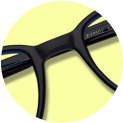
|

|
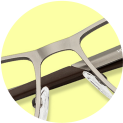
|
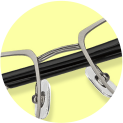
|

|
|
LIGHTWEIGHT |
|
|
|
|
|
FLEXIBILITY |
|
|
|
|
|
DURABILITY |
|
|
|
|
|
STYLE QUOTIENT |
|
|
|
|
|
ACETATE
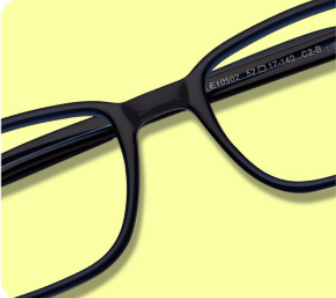
TR90
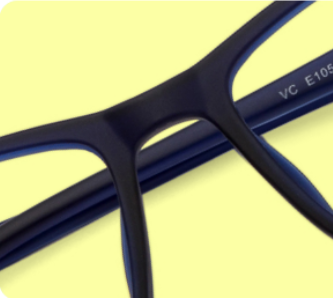
STAINLESS STEEL
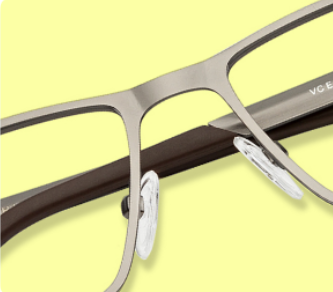
TITANIUM
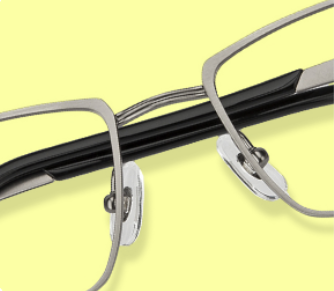
WOOD
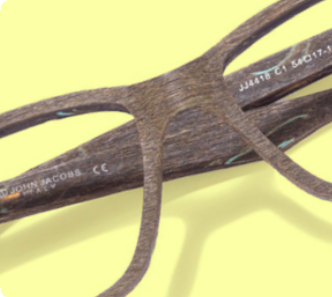
To know about more frame materials at length, click

LENS COATING
Why do we need lens coating?
Lens Coatings help to enhance the quality and performance of your lenses.
There are several types of coatings which can be applied to impart effective, long-life to your lenses.
Some of the most popular ones are -


SCRATCH
RESISTANT
No eyeglass lenses, not even glass lenses, are scratch-proof. However, lenses that are treated front and back with a clear, scratch-resistant coating have a much harder surface that is more resistant to scratching, whether from dropping your glasses on the floor or occasionally cleaning them with a paper towel.

LENS TYPE
Lenses are often treated with special coatings or technology to protect your eyes from harmful glare and eye-strains.
The technology helps to provide better visual acuity all throughout your eyewear journey. Some of the types are:


ANTI-GLARE OR
ANTI-REFLECTIVE
Also called AR Coating
Eliminates reflections of light
Improves vision


UV PROTECTION
Filters out 100% of UVA and UVB light
Blocks all light rays up to 400 nm
Provides optimum protection to eyes

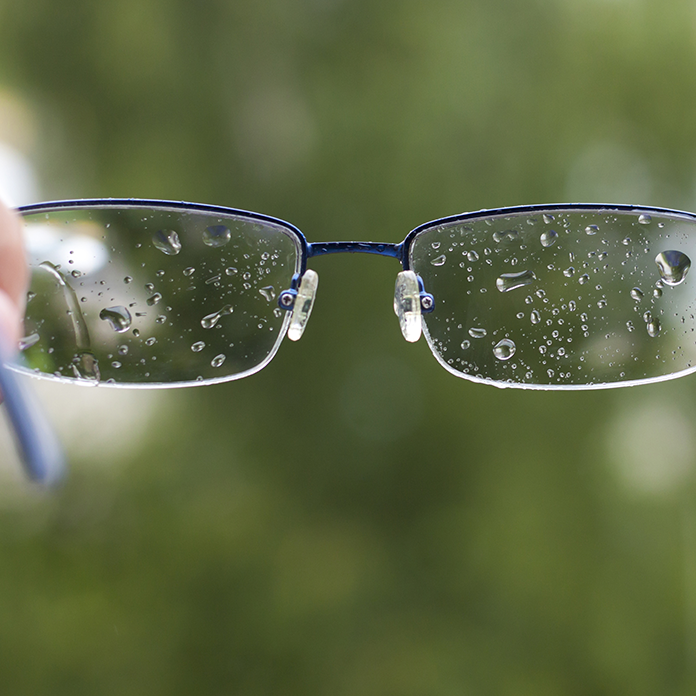
HYDROPHOBIC
ANTI-GLARE LENSES
Additional coating to repel water
Exhibits anti-glare properties
Easier to clean

PRESCRIPTION TYPE
It is important to find the right prescription type for your eyes before you buy eyeglasses. Find out if
you need single vision lenses, bifocals or progressives from the chart below:
| FIELDS OF VISION | ONE | TWO | THREE |
| VISION RANGE | NEAR OR DISTANT | NEAR AND DISTANT | NEAR, DISTANT & INTERMEDIATE |
| VISIBLE DISTINCTION | NO VISIBLE DISTINCTION | SINGLE VISIBLE LINE | NO VISIBLE DISTINCTION |
| CORRECTION | CORRECTS MYOPIA, HYPERMETROPIA & ASTIGMATISM |
CORRECTS PRESBYOPIA | CORRECTS PRESBYOPIA |
| FIELDS OF VISION | ONE |
| VISION RANGE | NEAR OR DISTANT |
| VISIBLE DISTINCTION | NO VISIBLE DISTINCTION |
| CORRECTION | CORRECTS MYOPIA, HYPERMETROPIA & ASTIGMATISM |
| FIELDS OF VISION | TWO |
| VISION RANGE | NEAR AND DISTANT |
| VISIBLE DISTINCTION | SINGLE VISIBLE LINE |
| CORRECTION | CORRECTS PRESBYOPIA |
| FIELDS OF VISION | THREE |
| VISION RANGE | NEAR, DISTANT & INTERMEDIATE |
| VISIBLE DISTINCTION | NO VISIBLE DISTINCTION |
| CORRECTION | CORRECTS PRESBYOPIA |
OR
DISTANT
SINGLE VISION
NEAR
BIFOCAL
NEAR
PROGRESSIVE

EYE & EYEWEAR CARE
EYE CARE

Maintain a good diet by including leafy vegetable, fruits, fish and nuts in your daily diet.

Try taking breaks from the screen time every 20 minutes for 20 seconds by looking 20 feet away. This is popularly known as the 20-20-20 rule.

Avoid smoking. It makes you more prone to cataracts and macular degeneration and can even damage your optic nerves.

Use safety eyewear or protective goggles especially when you indulge in sports like skiing, swimming, cycling etc.
EYEWEAR CARE
Follow certain tips below to help your eyeglasses last longer:

To start cleaning, rinse your glasses with lukewarm water. Dry them gently & always use a microfiber cloth to clean your glasses. Never resort to tissues/napkins/other clothing to wipe your lenses. The harsh texture of these can leave scratches on the lens and remove the protective coatings.

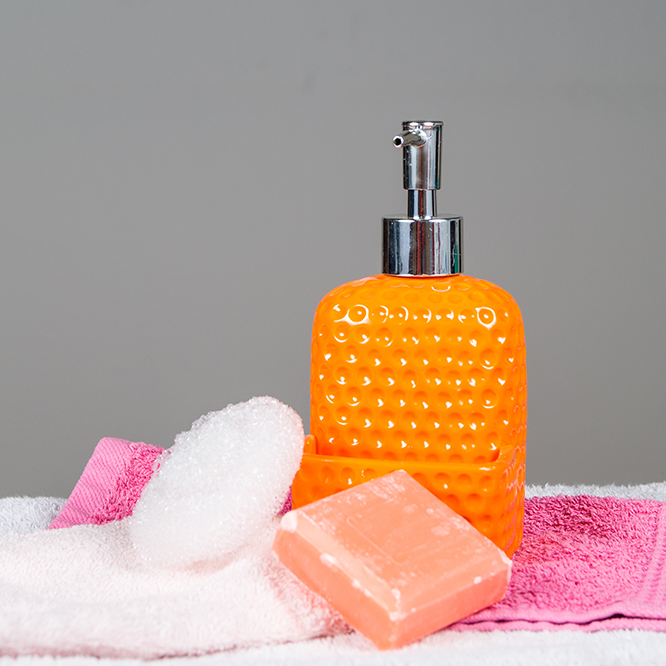
Do not use chemicals or soaps that are scented or contain dyes to clean your glasses either. Always use a protective lens spray like Aqualens Lens Cleaner by Lenskart. It is specifically designed for cleaning regular smudges, dust and facial oils from eyeglasses. This will not only preserve the shine of the frame, but will also help to increase the shelf life of the spectacles.
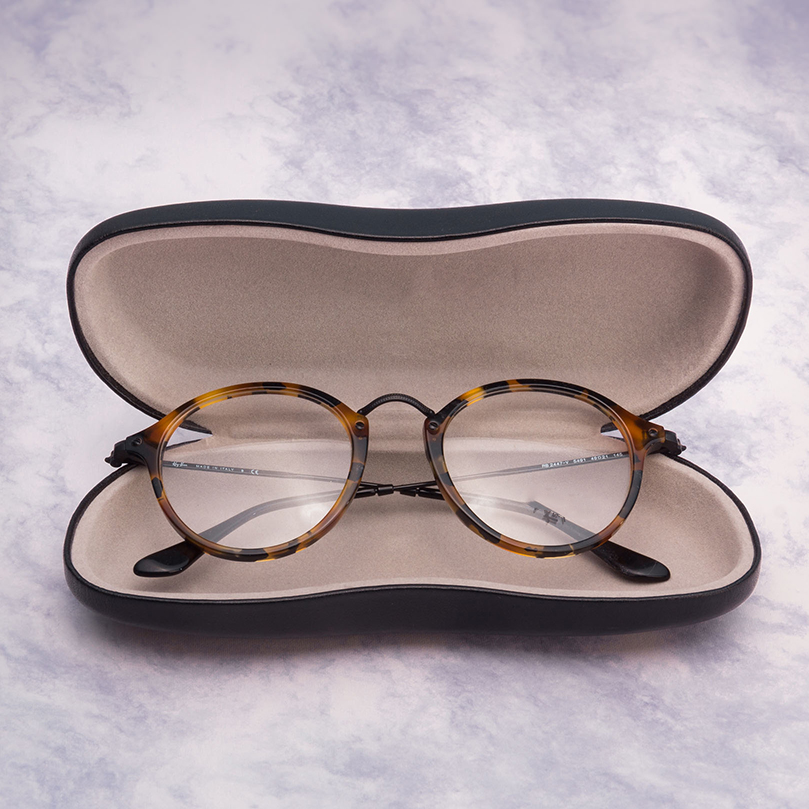
Do not store glasses in your pockets or backpacks. If you are not wearing them, keep them in a Hard Case or safe place like on an Eyewear Stand. Leaving your glasses unattended openly can cause dust to form a residue on the sides of the frame which can even enter the eyes and impede clarity.


Avoid placing your glasses on top of your head. Also, use two hands to take your glasses on and off. This will prevent them from getting loose over time. Just in case they do, use a handy Screw Driver to keep them as good as new!

POPULAR COLLECTIONS
Lenskart creates a mélange of style and superior designs – all under a single roof with
Vincent Chase and John Jacobs.
Vincent Chase aims to redefine eyewear fashion with its classic and contemporary styles, all in-line with the latest trends. VC strives to bring high-quality, durable designs at very affordable prices. Explore some of its most popular collections with Vagabond, Size Zero & Myriad - designed to impart a stunning statement to your look every time.
Discover the luxury of internationally appealing, premium designs with John Jacobs Collections. These bring back iconic elements from history and merge them together with the modish craftsmanship of today to get the very best on your eyes. Experience the opulence of owning a style statement with its most popular collections.

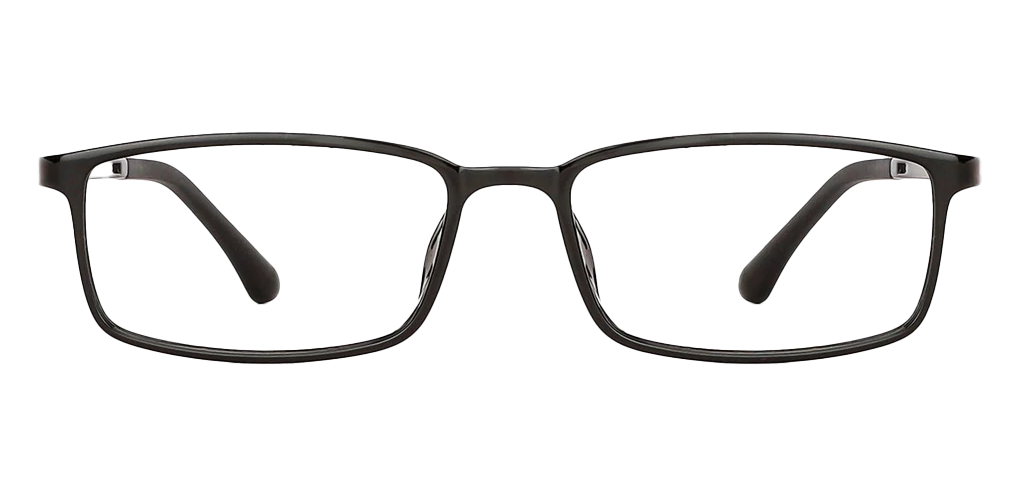

















 USD
USD CAD
CAD
